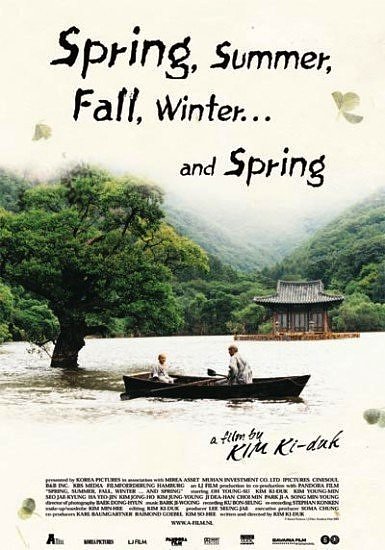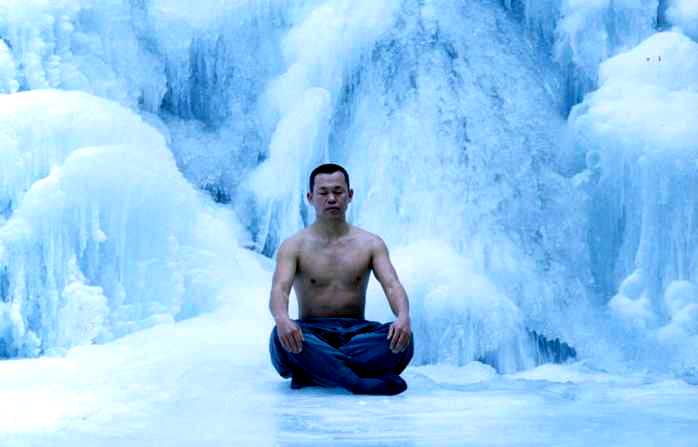
“Go and find all the animals and release them from the stones. Then I will release you too. But if any of the animals, the fish, the frog or the snake is dead… you will carry the stone in your heart for the rest of your life.” – Master to Protégé
The first time I watched it, I thought, “Wow, this is beautiful. But I don’t think I can last all the way through if there isn’t a story to support it.” Months of contemplation after I saw it, Spring, Summer, Fall, Winter… and Spring (2003, South Korea) became, for me, the Greatest Film Ever Made. A feat that bumps works by Stanley Kubrick, Martin Scorsese, Orson Welles and the Coen Bros. to runners-up. On my best days, it is a film I can talk about uninterrupted for hours. But only so much can be said in an essay to reach those who are unacquainted (which face it, is almost all of you readers). With those I know, I rhapsodically crave to share conversation over it. I want to discuss it with people who know more than I do, with people that know less than me, and with people who know way less. What’s it about? It’s about nothing less than spiritual birth and the renewal of the human soul.
In a beautiful locale that is the epitome of solace, a Buddhist pagoda floats on a lake that is, in every direction seen, removed from civilization. The Master (Yeong-su Oh), who has chosen a life of celibacy and prayer, cares after a young boy (Jong-ho Kim) whom he raises to be a monk like him. Their whole life centers around isolation and prayer – which sounds too inhibiting to the possibilities of a human life until you begin to admire the purity of it. What astounds me, as an aside, is the performance by Yeong-su whom I don’t see as an actor but as a genuine spiritual presence.
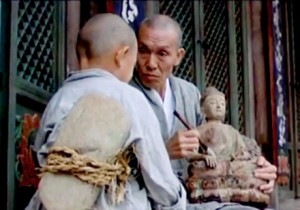 All boys demonstrate mischief at one time or another. The boy ties a stone to a fish, a frog and a snake to watch them suffer and giggles while he’s doing it. He awakes the next morning to find a heavy rock on his back, tightly bound, that his master has calculated. Untie the animals is the command. “You will carry the stone in your heart for the rest of your life,” the Master pronounces if the animals are dead. That’s the first 15 minutes of the film.
All boys demonstrate mischief at one time or another. The boy ties a stone to a fish, a frog and a snake to watch them suffer and giggles while he’s doing it. He awakes the next morning to find a heavy rock on his back, tightly bound, that his master has calculated. Untie the animals is the command. “You will carry the stone in your heart for the rest of your life,” the Master pronounces if the animals are dead. That’s the first 15 minutes of the film.
The film leap years ahead with each passage representing a new season. In the summer, we see the boy has now become a young monk (Seo Jae-kyung). The master and monk welcome the arrival of a mother (Kim Jung-young) and her young teenage girl (Ha Yeo-jin) who is sick, although we never learn what her illness is. It could be many things, and because there is no bodily damage or sign of cancer, we can assume that this is a spiritual sickness that stems from trauma.
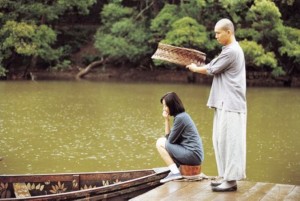 The young protégé and girl like each other. Celibacy is broken, and the film is not shy about sex. But observe with wonder – here’s a boy who has discovered sex naturally without the aid of pornography, the jade of social media, the influence of puerile schoolboys. I envy how sex is discovered naturally as well as absolutely. Sex for the girl feels positive as well. It is implied to be a cure for whatever she is going through.
The young protégé and girl like each other. Celibacy is broken, and the film is not shy about sex. But observe with wonder – here’s a boy who has discovered sex naturally without the aid of pornography, the jade of social media, the influence of puerile schoolboys. I envy how sex is discovered naturally as well as absolutely. Sex for the girl feels positive as well. It is implied to be a cure for whatever she is going through.
Up until now, we observe change in attitudes of a young man in reconsidering his devout life. We have observed daily rituals and then we see broken rituals, moments of the boy rebelling. We witness the faults of the young boy and then the transgressions of him later as a young man. We witness the joys of sex, the clarity of solitude, and the disconnect of those two that cause inner conflict. To explain practically: I sometimes want something else from my life, but then destiny kicks in and urges me to continue with my life’s work. I had wished to alter my identity, but destiny has already been decided.
I have sometimes acted out in fury in my lifetime as well, and have struggled to return to my calm center. The young boy deserts his master and upbringing, leaving for a decade. He returns as a grown-up (now played by Young Min-Kim) who is possessed by inconsumable rage. What does it really take for a man of anger to return to a calm center? The Fall segment of the film depicts his penance, which calls for humility as well as concentration. Accepting beatings is part of his rehabilitation.
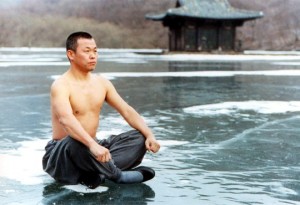 I would find it negligent to not mention yoga for the Winter segment. This discipline is a means to restoration of the pure spiritual practices the character grew up on. New visitors come, a mother and a baby which become a new responsibility. It’s evident that the protégé has now become master because he has accepted this as his identity. He has attained likeness to his Master – whom has passed. And yet something tells us he has reincarnated into the vessel of an animal. It could feel like a throwaway shot but somehow the animal of choice seems to move with purpose, with an acute awareness. I wonder how many shots it required to achieve this.
I would find it negligent to not mention yoga for the Winter segment. This discipline is a means to restoration of the pure spiritual practices the character grew up on. New visitors come, a mother and a baby which become a new responsibility. It’s evident that the protégé has now become master because he has accepted this as his identity. He has attained likeness to his Master – whom has passed. And yet something tells us he has reincarnated into the vessel of an animal. It could feel like a throwaway shot but somehow the animal of choice seems to move with purpose, with an acute awareness. I wonder how many shots it required to achieve this.
The final “…and Spring” is the briefest segment. We have come to witness the circle of life, all in a 95 minute film. The directing is always highly conscious, relevant, and visually strong.
The filmmaker is Kim Ki-Duk who has been lucky enough to make 18 films with hardly one of them pandering to commercialism. In his twenties, he traveled to Paris to become a painter, selling art on the streets. He was not a film aficionado, he attests. But in that year of 1991 he saw three films that made him want to become a filmmaker: “Lovers on the Bridge,” “The Lover” and “The Silence of the Lambs.” When you see Ki-Duk’s films, you will notice many murals in the background which he draws himself. Also the oldest version of the character in “Spring Summer Fall Winter… and Spring” is the only time Ki-Duk has acted in himself.
 There is a lack of conventionality and formula in Ki-Duk’s films, perhaps because he did not grow up indoctrinated by formula films since he saw so few. Let me list in order my favorite films of his: “3-Iron” (2005) is a beautiful and spiritually deep love story that is also among the very best films ever made; “The Isle” (2000) is a mind-bending allegory on controlling others through sex; “The Bow” (2005) is as upsetting film I’ve seen about the lengths a man will go through to possess a young girl; “Time” (2006) is the most haunting toxic relationship movie I’ve seen – it almost cuts too close to the bone.
There is a lack of conventionality and formula in Ki-Duk’s films, perhaps because he did not grow up indoctrinated by formula films since he saw so few. Let me list in order my favorite films of his: “3-Iron” (2005) is a beautiful and spiritually deep love story that is also among the very best films ever made; “The Isle” (2000) is a mind-bending allegory on controlling others through sex; “The Bow” (2005) is as upsetting film I’ve seen about the lengths a man will go through to possess a young girl; “Time” (2006) is the most haunting toxic relationship movie I’ve seen – it almost cuts too close to the bone.
Ki-Duk’s other films are equally uncompromising. “Samaritan Girl” (2004) contains audacious material of a teen needlessly prostituting herself when she has a caring father and a decent middle class home; “Address Unknown” (2001) is one of the most despairing movies I’ve ever seen, examining Korean citizen poverty set in a region outside of a U.S. army base; “Birdcage Inn” (1998) about a family so poor they send their daughter to school by day and prostitute her at night; “The Coast Guard” (2002) is of a soldier’s guilt after the accidental killing of a local citizen, an interesting and worthy drama until the protagonist becomes a symbolic abstraction. Accumulatively, and overall, these films have changed what I’m looking for when I watch film.
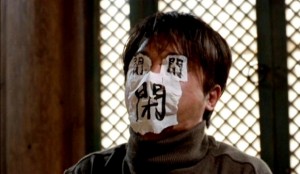 Kim Ki-Duk’s euphoric film is to be carried with you in your heart and mind, day to day, for now and for the future, from birth to old age. Mesmerizing is not a word I’ve used often. I had trouble writing this essay because my eyes are glued to the screen. To get the words printed here I’d have to put it on pause even though I’ve seen it ten times already. With no sound on, it still transports me into a realm of altered states.
Kim Ki-Duk’s euphoric film is to be carried with you in your heart and mind, day to day, for now and for the future, from birth to old age. Mesmerizing is not a word I’ve used often. I had trouble writing this essay because my eyes are glued to the screen. To get the words printed here I’d have to put it on pause even though I’ve seen it ten times already. With no sound on, it still transports me into a realm of altered states.
Click here to read feature on best films of the decade article.
95 Minutes. Rated R.
Film Cousins:
“The Last Temptation of Christ” (1988); “Orlando” (1993); “Chunhyang” (2000, South Korea); “Waking Life” (2001); “3-Iron” (2005, South Korea); “The Master” (2012).

